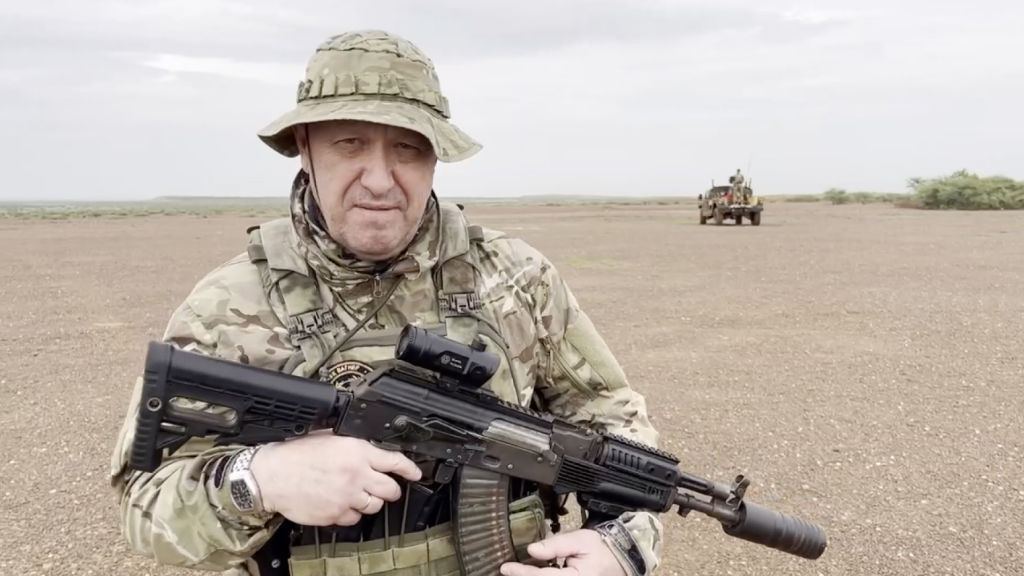Questions still surround the fate of the Wagner group, the mercenary outfit whose founder, Yevgeny Prigozhin, died in a private jet crash near Moscow last week. But the Russian government looks poised to wield the muscle and influence in Africa that Prigozhin and his private military company enjoyed for years.
Accounts of Prigozhin’s final days, most of them spent in Africa, suggest his killing may have been part of a brewing fight for regional influence between the Kremlin and Wagner following the mercenary group’s short-lived putsch in June.
Just two days before his death, a camouflage-clad Prigozhin gripped an assault rifle and spoke directly to a camera in what may be the last footage seen of him alive.
“Everything is how we like it,” the Wagner group chief said in a video posted to Telegram, an arid stretch of land rumored to be Mali visible behind him. “Wagner is conducting reconnaissance and search operations, making Russia even greater on all continents, and Africa even freer.”
Two days later, Prigozhin and eight others, including Wagner founding commander Dmitry Utkin, were dead. Analysts quickly pointed to Russian President Vladimir Putin as the likely orchestrator of the crash, but other circumstances surrounding the shadowy leader’s untimely death remain unclear. A Wagner-affiliated Telegram channel, Grey Zone, announced that the mercenary leader had “died as a result of Russia’s enemies.”
Prigozhin’s death may have primarily been driven by the mercenary group’s attempted coup back in Russia two months ago, but there’s mounting evidence that Moscow had begun sowing the seeds to dismantle Wagner as an independent entity prior to Prigozhin’s death and building up its own government-backed forces in Africa.
Wagner first arrived in Africa in 2017, after then-Sudanese President Omar al-Bashir sought out help from Putin in shoring up his unpopular regime. The Russian president sent arms, equipment, and Wagner military advisers to the country. Wagner struck similar deals and sent troops to the Central African Republic in early 2018 then later to fight alongside warlord Khalifa Haftar’s forces in Libya and the government in Mali that came to power after a coup.
Wagner now has some 5,000 personnel stationed across the continent, with significant mercenary deployments in at least three countries. Its sponsors range from autocratic regimes to rebel militias, but all share an anti-Western ethos and are typically the targets of U.N. sanctions. In exchange for providing security assistance, Wagner gets cash payouts and the right to extract natural resources, running lucrative mines and oil fields in a number of African countries.
Its Africa operations are also marred by war crimes, including looting, rape, torture, and extrajudicial killings. In Mali, where civilian deaths have risen 278 percent since Wagner arrived in 2021, the mercenaries were behind a massacre of at least 500 civilians in the town of Moura last year, a recent United Nations report found.
Wagner’s incursions into Africa have benefited the Russian government. In addition to lining its own pockets, Wagner has served as an extension of Russian influence on the continent, while China and the West also vie for political clout. Wagner disinformation campaigns and political lobbying on behalf of the Kremlin have allowed Russia to win key U.N. General Assembly votes and disrupt U.S. and European interests in the region, all while maintaining the guise of plausible deniability.
But the guns-for-hire and the Kremlin increasingly clashed over Wagner’s African foothold, and assassinating the Wagner chief may have been the “final step” in that clash, a recent report from the Washington, D.C.-based Institute for the Study of War (ISW) assessed. Throughout the summer, the Russian defense ministry had sought to form its own “private” security companies, including through the recruitment of Wagner fighters, in the hopes of upending the mercenaries’ foothold in Africa. Russian sources further claimed that Moscow had appointed the deputy head of its military intelligence agency, the GRU, to oversee Wagner fighters’ ousting and train more than 20,000 replacements.
Prigozhin pushed back, releasing the video last week with the apparent hopes of recruiting new fighters—a move which could have been the impetus for his killing 48 hours later, the ISW report noted.
With Wagner’s fate post-Prigozhin uncertain, Moscow is trying to assure its African allies that everything is business as usual. In countries already rife with political instability, any power vacuum could create an opening for jihadist groups or local competitors. Wagner-affiliated Telegram channels have denied that any successors to Prigozhin have been named.
“To a certain extent it’s like other companies, where if the CEO is gone all of a sudden, people still have to wake up the next day and go to work and fulfill the obligations of the company and their job,” says John Lechner, an independent researcher and author of a forthcoming book on Wagner, adding that it will take time for the Russian defense ministry to absorb the group’s operations. “Prigozhin and Utkin are going to be kind of irreplaceable as the founders, especially Prigozhin with his charisma, his ability to bring different people together, and his penchant for logistics.”
But as long as military assistance remains uninterrupted, analysts say, it doesn’t matter if the troops have a Russian flag or Wagner insignia on their shoulders.
“These countries that are working with Wagner are not on the fence about whose side they’re on. They’ve thrown their lot in with the Russians, whether that’s the Wagner group or the Russian MOD,” Cameron Hudson, a senior associate at the Center for Strategic and International Studies’ Africa Program and a former CIA analyst, tells The Dispatch. “They are rejecting Western partnership in the security space in favor of working with Russia and with Wagner.”







Please note that we at The Dispatch hold ourselves, our work, and our commenters to a higher standard than other places on the internet. We welcome comments that foster genuine debate or discussion—including comments critical of us or our work—but responses that include ad hominem attacks on fellow Dispatch members or are intended to stoke fear and anger may be moderated.
With your membership, you only have the ability to comment on The Morning Dispatch articles. Consider upgrading to join the conversation everywhere.